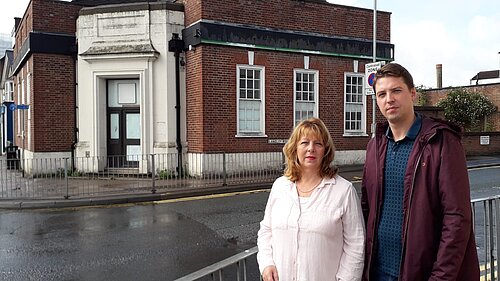Lloyds Bank HQ sold – as housebuilding targets set for axe

A locally listed Art Deco former Lloyds Bank on St Albans Road has been sold to a property developer. Planning approval was given in 2019 to turn the building into 14 flats and a retail unit.
Developers had wanted to build 21 flats in nine storeys. When the council refused permission, the previous developer appealed to overturn this. Last March it was a final victory for residents and the council when the refusal was upheld. The building was then put up for sale again for £1.5 million, with a buyer finally found in November.
The chartered surveyor which had been marketing the property told the Watford Observer in November that they believed the new owner would be commencing work on the project soon.
“I am pleased that a buyer has been found, and that the site will no longer be an empty eyesore and a magnet for fly-tipping,” said Nascot councillor Mark Hofman, pictured here with local resident and Liberal Democrat campaigner Jane Johnson. “Councillors and residents will continue to do their utmost get unacceptable developments refused, however.”
The move comes amid news the government could be forced to scrap centrally-imposed housing targets for local authorities, following a rebellion by Conservative backbenchers and intense pressure from local councils including Watford.
Mayor Peter Taylor said: “I have been campaigning against our unfair housing targets, which are too high, for many years and I am glad that the government has finally made the commitment to scrap them. Of course it is important that we wait to see what replaces them before we celebrate too much.
“With the removal of targets, and our newly adopted Local Plan, we should now have more power to say no when proposed developments are not right for us.
“Going forward, the government now needs a proper plan for new homes to be built in all parts of the country, with the services and infrastructure needed to create new communities. It was never right to try to force so much development in places like Watford, with residents given too little say.”
